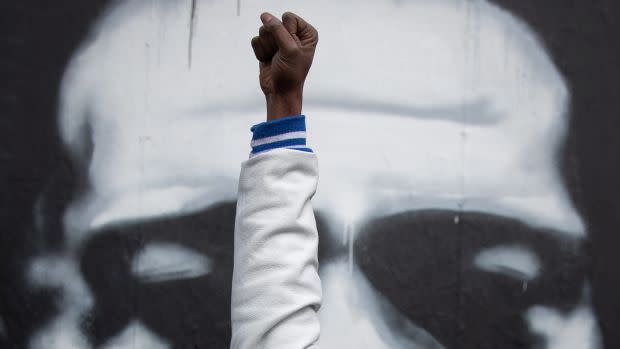Chauvin prosecutor Keith Ellison makes a powerful call for “the work of our generation”
- Oops!Something went wrong.Please try again later.

“Since the investigation and the prosecution of this case began last May, everyone involved has pursued one goal: justice,” said Minnesota’s attorney general Keith Ellison in a press conference following former policeman Derek Chauvin’s conviction on two counts of murder and one count of manslaughter in the killing of George Floyd.
“I would not call today’s verdict justice, however, because justice implies true restoration. It is accountability, which is the first step towards justice—and now the cause of justice is in your hands, and when I say ‘your hands’ I mean the people of the United States,” he added.
In his speech, Ellison thanked his team of “all Michael Jordans”— who worked tirelessly and collaborated in pursuit of a common goal, the community who patiently let prosecutors work and gather all needed evidence despite the urgency of the trial, and the jurors who delivered the sentence.
Most powerfully, Ellison borrowed a description from attorney Jerry Blackwell when he thanked the “bouquet of humanity” comprised of the witnesses who tried to stop Chauvin from murdering Floyd, recorded the crime, and testified in front of the court, performing what Ellison called “a simple, yet profound act of courage—they told the truth, and they told the whole world the truth, about what they saw.”
By highlighting their role in the quest for justice, Ellison outlined the road ahead for all Americans after the Chauvin verdict—what he called “the work of our generation.”
Demanding accountability from law enforcement
Ellison briefly recalled the US’ history of police brutality and white supremacy that led to the deaths of too many Black Americans, and the subsequent uproar each death generated, such as the race riots in Chicago in 1919, or Harlem in 1935. He reminded the audience of what African American psychologist Kenneth Clark described in 1968 as “the same moving picture reshown over and over again, the same analysis, the same recommendations, and the same inaction.”
Decades later, in 2020, the same script ended with the murder of Floyd. “We’ve seen Rodney King, Abner Louima, Oscar Grant, Eric Gardner, Michael Brown, Freddie Gray, Sandra Bland, Philando Castile, Laquan McDonald, Stephon Clark, Atatiana Jefferson, Anton Black, Brionna Taylor, and now Daunte Wright, and Adam Toledo,” he said. “This has to end. We need true justice. That’s not one case. That is a social transformation that says no one is beneath the law and no one is above it.”
Ellison asked for “enduring, systemic, societal change” and urged lawmakers to use this verdict as both a template for the prosecution of future such cases and a potential deterrent for tragedies of this nature. The role of police and its use of force needs to be reexamined, Ellison said, stressing the need for stronger accountability measures. The relationship between communities and “the people who are sworn to protect them” has to move, he said, “from one that is mistrustful, suspicious, and in some cases terrifying into one that is empathetic, compassionate, and affirmative.”
“The work of our generation”
Ellison’s most powerful words concerned the role of citizens in demanding the end of police impunity and white supremacy. “This verdict demands us to never give up the hope that we can make enduring change,” he said.
His words served as a reminder of the power of collective action, and a call to heed a moral duty Americans cannot hide from.
“Generations of people said slavery would never end. Generations said Jim Crow would never end. Generations said women would never be equal to men. Generations said if you are different in any way you can never be a full and equal member of our society. Today we have to end this travesty of recurring, enduring deaths at the hands of law enforcement,” he said.
“The work of our generation is to put an end to the vestiges of Jim Crow and the centuries of trauma and finally put an end to racism. We can end it. It doesn’t have to be with us. We can decide now to have true liberty and justice for all,” Ellison continued, highlighting again the bouquet of humanity as a model for citizen action.
“It’s in your hands—let’s get the work done,” he concluded.
Sign up for the Quartz Daily Brief, our free daily newsletter with the world’s most important and interesting news.
More stories from Quartz:
India’s Covid-19 crisis has gone from bad to catastrophic in just a fortnight
America’s wholesome square dancing tradition is a tool of white supremacy
